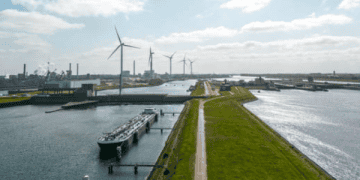A recent study by the International Energy Agency (IEA) reveals that transportation accounts for up to 37% of global greenhouse gas emissions, highlighting its significant role in logistics. As developing economies in Asia, Africa, and Latin America anticipate a threefold increase in freight demand by 2050, the need for sustainable development in logistics becomes increasingly urgent. In response to these trends, many companies in the transportation sector are investing in the modernization of equipment, shifting from oil-based operations to electric or clean fuel alternatives for cranes and vehicles in port facilities.
Truong Nguyen Linh, deputy general director of Vietnam International Container Terminal (VICT), emphasized the importance of upgrading the extensive seaport management system. “We are working to improve various subsystems and invest in developing an electronic port system,” Linh stated. This year, VICT aims to achieve ISO 9001 standardization, with plans to pursue ISO 14000 certification for environmental management and ISO 45000 for occupational health and safety. To address environmental concerns, VICT is implementing measures to reduce air pollution and noise, such as using barges for transporting goods instead of relying solely on container trucks. In 2023, the terminal will begin transitioning to an electronic seaport model (Eport), allowing customers to access real-time data on ships and cargo, with a goal of establishing a “green port” by 2024.
For companies in the road transport sector, transitioning to green logistics poses significant challenges. This initiative involves replacing internal combustion engine vehicles with electric or hybrid options and utilizing biofuels and sustainable fuels. Experts note that inadequate transport infrastructure, particularly in remote areas, complicates the adoption of environmentally friendly vehicles. The absence of supporting infrastructure, such as electric vehicle charging stations and green distribution centers, presents further obstacles for businesses.
Harry Lu, development director of Sunny Auto Company, pointed out that switching from diesel to electric vehicles could reduce carbon emissions by 50-60%, and using solar energy for charging could lead to over 90% reduction. However, he acknowledged that the current conditions in Vietnam are not conducive to such transitions due to a lack of large-capacity charging stations. MSc. Cao Minh Nghia, deputy head of the Economic Development Department at the Ho Chi Minh City Institute for Development Studies, emphasized the importance of collaboration among businesses. “Small enterprises should partner with larger companies that have established systems to foster mutual growth. State support is essential, while businesses must recognize that logistics transformation is a critical task,” Nghia explained.
Transitioning to green logistics is not only a responsibility but also a vital opportunity for businesses. In an era of deep international economic integration, companies that fail to adopt sustainable practices in logistics may encounter significant challenges and risk becoming less competitive in domestic and global markets.
Explore top supply chain news stories at The Supply Chain Report. Visit ADAMftd.com for free international trade tools.
#GreenLogistics #SustainableTransportation #LogisticsInnovation #EnvironmentalImpact #SupplyChainEfficiency















